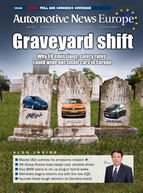Just a month into the job, Daimler's new executive duo is back to unearthing skeletons from the diesel-scandal era, highlighting how a crisis that erupted almost four years ago continues to plague the German car industry trying to reinvent itself for an electric future.
Operating profit this year will fail to grow, Daimler said late Sunday in its third downgrade in a year, after previously promising a slight earnings gain for 2019. The company blamed proceedings around allegations of emissions tampering in diesel cars for the more muted outlook, which required higher provisions to account for recalls. The stock fell as much as 5.1 percent, almost erasing the gain that Daimler had built up since the start of the year.
The more pessimistic outlook heaps pressure on CEO Ola Kallenius and CFO Harald Wilhelm to implement their proposal to rein in costs and restore profitability, having taken over only recently from long-term CEO Dieter Zetsche. But investors say the duo’s future strategy remains light on details, while lamenting the rapidly recurring revisions that are without precedent in the German car industry.
“It all comes back to the same old fact: Daimler needs to execute better,” said Arndt Ellinghorst, an analyst in London at Evercore. “The endless array of so called “one-time” effects raises questions regarding process, management information systems and ultimately accountability of management.”
Ups and downs
Zetsche’s own tenure of more than a dozen years had known its ups and downs, skewed towards the latter in the period before his departure. After managing to return Daimler to the top of the luxury-car pack, his last year at the helm was marked by two profit warnings and a falling stock price, which ended the year down by more than a third, a considerably poorer return than its two big German rivals, BMW and Volkswagen Group.
The German car industry is facing a litany of issues, from the costly switch to electric and self-driving cars, to the trade war between the U.S. and China that has complicated sales, because some of the biggest production sites sit in the U.S. and ship their cars to Asia.
And while the diesel crisis first erupted at VW in late 2015, it has engulfed the entire industry. Days before the latest warning, Daimler suffered a fresh setback when German regulators issued a mandatory recall for about 40,000 Mercedes GLK SUVs over potentially illegal software to skirt emissions rules. A spokesman declined to comment on a connection to the profit warning.
German authorities already slapped Daimler with a recall of 774,000 diesel cars in Europe last June over the use of prohibited devices regulating their emissions. The company continues to claim a clean-engine record.

